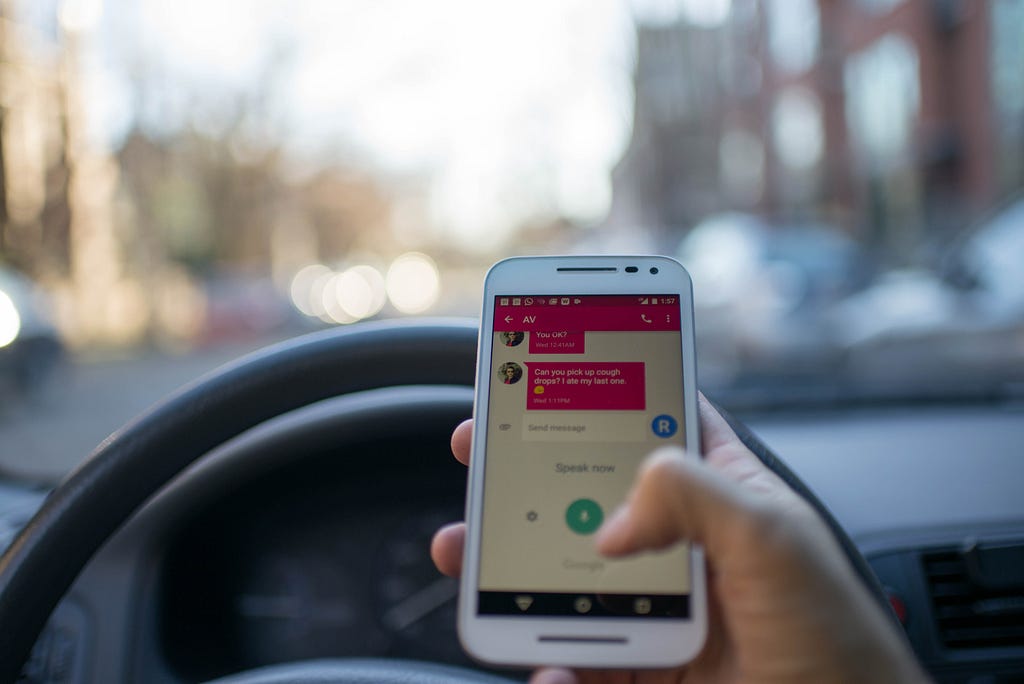Latest news about Bitcoin and all cryptocurrencies. Your daily crypto news habit.

We’ve all seen them. The drivers driving like car lanes are optional and the highway is a slalom slope. When we finally pass them, we are not surprised to see a phone in their hand. We shake our head in disbelief, only to realize that we have been that exact person.
Texting and driving is an enormous problem. It essentially means driving machines weighing tonnes, going 80 miles an hour, while sporadically closing your eyes for three seconds at a time.
Different approaches have been tried to prevent this problem, not the least legislative ones. Upon realization of how dangerous texting while driving actually is, many countries have taken the action to completely ban cell phone use while driving. However, a study from 2018 concluded that universal texting bans in cars were not associated with fewer people texting, and that deeper interventional and educational work was needed.
Before anything else, let me be very clear of my opinion: I don’t believe that there is any more preferable solution to this problem than people simply letting their phones rest. In a world where most of us are slaves to any small notification that appears, driving should be the last place where we surrender to these distractions.
In an interview in The Drive, neuroscientist Sam Harris presented a horrifying idea for a website that would undoubtedly put things into perspective for people:
Imagine a website where you present the texts that were the proximate cause of death. The juxtaposition of what people felt couldn’t wait another 30 seconds, or another 30 minutes, and the tragedy… It would be astonishing.
Picture a table, where the left field shows the victim of death; “Mother of two”, and the right displays the text message that caused the fatal accident; “I had two eggs for breakfast, how about you?”. Most likely, the majority of the texts would prove to be similarly trivial.
Yet, the sad truth is that people will not stop texting in their cars. Even if presented with horrendous statistics and stories, most of us are convinced that these accidents only happen to other unskillful drivers. 77 percent of adult drivers claim they can “easily manage” texting and driving. I probably would to.
If neither legislative action nor social pressure will stop drivers from texting in their cars, we are left with one option; to make texting while driving as safe as possible, and right now, that means looking into voice technology.
Voice
Voice is a comparatively new technology, but it has already become very interesting. Voice assistants like Alexa and Siri are starting to turn into actual embodiments of AI, delivering multiple advanced functions to us from a simple voice command. One of which, is texting.
If people are going to text in their cars even when illegal, the first step we need to take is to make sure they do it without looking at a shiny screen, and voice assistants are the antidote to that. Voice-to-text technology has the potential to become synonymous to someone next to you in your car.
If you find yourself texting while driving, I would recommend getting a voice assistant. There are plenty to choose from:
- Roav VIVA: Compatible with Android and iOS Smart Devices. USB-charger/Voice-assistant. Does everything from text messaging to giving directions and playing your favorite audiobook.
- Garmin Speak: Like above, without charging. Claims to do more, a bit better-looking.
- Amazon’s new Echo Auto is coming sometime this year soon and it’s looking pretty good.
- If you’re using Android you might be able to use Google Assistant with the Android Auto app. See here if your car is compatible.
Of course, if you have a smartphone, chances are you already have a competent voice robot in your pocket, which brings me to the phone mount.
Phone mount
As VC and writer Riva Tez once tweeted:
I wonder how many accidents would be avoided and lives would be saved if we simply made it mandatory for all cars to come with built-in cell/mobile holders (why isn’t this law?!)
If governments want to find a regulation with 100 percent certainty of lives saved, requiring car manufacturers to have their cars come with a phone holder would be one.
For the time being, I’ve gotten one for myself, and I highly recommend it:
(I don’t know that there is any difference between those particular ones, I mean, how good could a phone holder be? Any will do.)
Of course, there is more a driver can do on a phone than texting. I have no clue what to do about the so called “driving and swiping problem” for instance. But there is no reason why we shouldn’t make every area we can affect as safe as possible.
Texting while driving truly is a devastating issue. Several studies have found it to be more dangerous than drunk driving, which in my opinion should suffice as a basis for a discussion regarding harsher sentences.
There are certainly reasons to be doubtful of voice assistants in cars. One study has been done that showed that voice applications doesn’t really outperform texting regarding safety. However, the study was done in 2013 with 43 participants using fairly underdeveloped versions of Siri and Vlingo. Today, voice assistants are much faster and more capable, and they have plenty of room for improvement.
Voice applications for cars is certainly another form of distraction, and the alternative of no mobile stimulus at all, is much safer. But at a large scale, people will not put their phones down in their cars, and if we close our eyes to that fact, we can’t improve it.
So while we wait for innovations that automatically turn off our phones above 10 mph, or cars so good at driving themselves that we don’t even need to care about the steering wheel anymore, let’s do what we can to make technology work for our safety.
People Are Not Going to Stop Texting And Driving was originally published in Hacker Noon on Medium, where people are continuing the conversation by highlighting and responding to this story.
Disclaimer
The views and opinions expressed in this article are solely those of the authors and do not reflect the views of Bitcoin Insider. Every investment and trading move involves risk - this is especially true for cryptocurrencies given their volatility. We strongly advise our readers to conduct their own research when making a decision.
